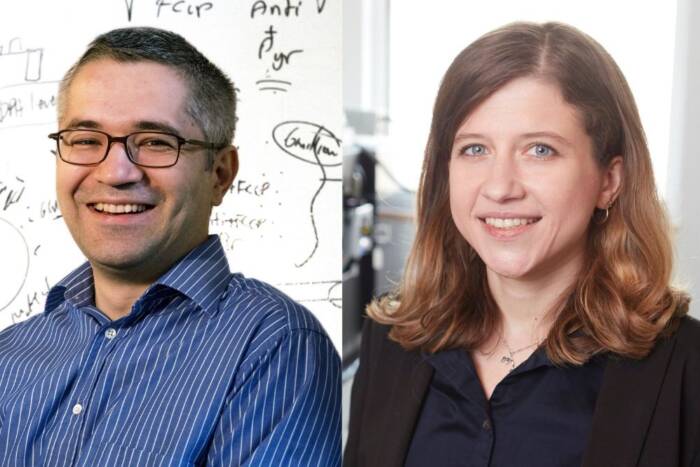Rockefeller joins city partnership to reduce carbon footprint

Rockefeller’s Amy Wilkerson (left) and Alex Kogan (right) with NYC Mayor Eric Adams (Caroline Rubinstein-Willis / Mayoral Photography Office)
The Rockefeller University has long taken steps to reduce the collective carbon footprint of campus diners. For years, it’s served locally sourced seasonal food, which greatly reduces shipping distances, fuel use, and carbon dioxide emissions, and composted its food waste into nutrient-rich soil for campus gardens. All plates and utensils in the Bass Dining Commons and CRC Café are reusable, recyclable, or biodegradable.
Now the university is joining an NYC government initiative to further reduce food-related carbon emissions by offering more plant-based dining options on campus. The Mayor’s Office Plant-Powered Carbon Challenge encourages institutional participants to decrease the use of meat- and dairy-based products—which create far more carbon emissions than plant-based foods—in order to lower their carbon emissions by 25 percent by 2030.
The target was informed by an annual greenhouse gas (GHG) analysis the city undertakes as part of PlaNYC, a long-term vision for combating the impact of climate change on the Big Apple. The 2023 report found that food consumption produces 27% of the city’s carbon emissions—the third highest source after buildings and transportation.
The Mayor’s Office of Food Policy will assist Rockefeller and other participating institutions—which include Columbia University, the Wildlife Conservation Society, and Great Performances, Rockefeller’s food vendor—by helping to develop a plan for meeting the carbon-reduction target, tracking emissions, creating appealing plant-forward menus, and implementing other best practices.
This isn’t the first time Rockefeller has gone all in on a city-led, green-focused initiative. In 2008, the university pledged to reduce university carbon emissions in response to a call from then-Mayor Mike Bloomberg. Since then, emissions are down over 30 percent despite construction of new buildings and three data centers.
The challenge also meshes with Rockefeller’s long-standing sustainability commitments, which touch every aspect of campus operations, from construction and procurement to energy and water use. To that end, in February, 10 Rockefeller labs signed on with the nonprofit organization My Green Lab to spend 6 to 9 months working toward certification for incorporating sustainable practices into their research environments, including energy efficiency, water conservation, waste reduction, and responsible chemical use.
“The Rockefeller University has a long history of addressing some of the world’s leading challenges through science, and joining the Plant-Powered Carbon Challenge is a natural extension of our commitment to bettering humanity,” says Rockefeller’s Amy Wilkerson, associate vice president of research support. “Plant-based foods have a significantly smaller footprint on the environment, and increasing access to them on our campus is an important part our overall sustainability program. We are proud to partner with the mayor’s office to promote a more sustainable future for our city and planet, as well as provide healthier options for our own community.”


